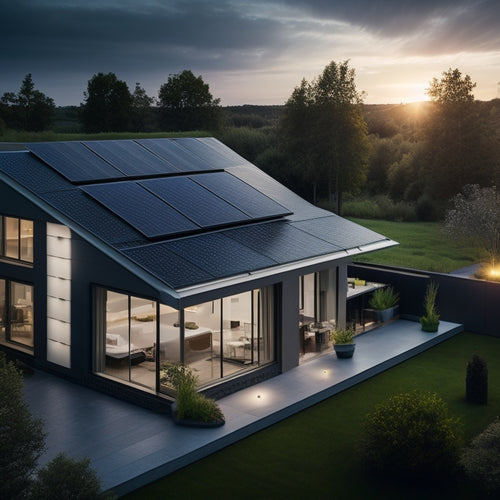
Benefits of Off Grid Inverters in Renewable Energy
Share
Off-grid inverters offer significant benefits in renewable energy systems, enhancing your energy independence and increasing cost-effectiveness. By utilizing renewable sources, you can slash your electricity bills and minimize reliance on utility providers. These inverters also improve energy efficiency, maximizing power conversion and reducing waste. Additionally, the ability to integrate various renewable sources allows for a customized energy ecosystem designed to your needs. With lower maintenance and monitoring tools, you can guarantee peak performance and financial forecasting. Uncover how to utilize these advantages to create a more sustainable and self-sufficient energy future.
At a Glance
- Off-grid inverters reduce electricity bills by harnessing renewable energy, leading to significant long-term savings and financial stability.
- They promote energy independence, minimizing reliance on utility companies and enhancing self-sustainability in energy production.
- High power conversion efficiency maximizes renewable energy utilization, reducing waste and extending the lifespan of battery systems.
- Accurate load capacity ratings ensure that inverters meet energy demands, optimizing performance and preventing overloads.
- Off-grid systems support a variety of renewable sources, enabling customized energy solutions and improving overall energy efficiency.
Cost-Effective Energy Solution
By investing in off-grid inverters, you can greatly reduce your electricity bills while utilizing renewable energy sources.
These inverters not only provide a cost-effective energy solution but also contribute to energy independence, minimizing your reliance on traditional power sources.
This approach not only minimizes your monthly expenses but also offers considerable long-term savings potential as utility rates rise.
You'll find that these systems aren't just an expenditure but a strategic financial decision for sustainable energy independence.
Reduced Electricity Bills
A notable reduction in electricity bills is one of the most convincing advantages of using off-grid inverters. By utilizing renewable sources such as solar or wind, you can bypass the costly grid connection, and in turn, reduce your monthly expenses considerably. With innovative inverter technology, your system can efficiently convert and store energy, allowing for effective energy budgeting.
Here's a quick comparison of potential savings with off-grid inverters versus traditional grid-connected systems:
| Factor | Off-Grid Inverters | Grid-Connected Systems |
|---|---|---|
| Initial Installation Cost | Moderate | High |
| Monthly Electricity Bills | Minimal | Considerable |
| Maintenance Requirements | Low | Moderate |
During the installation process, you'll appreciate that maintenance requirements are generally lower for off-grid systems, contributing to their long-term cost-effectiveness. Plus, with energy monitoring tools, you'll gain understanding into your energy usage, allowing for smart system integration that aligns with your financial incentives. Ultimately, this approach reduces your overall environmental impact while equipping you with energy independence.
Long-Term Savings Potential
Investing in off-grid inverters offers considerable long-term savings potential, converting energy generation into a cost-effective solution. By utilizing renewable energy sources, you can greatly reduce your reliance on traditional power grids, leading to lower operational costs over time.
When you conduct an investment analysis, you'll see that the initial setup costs are often outweighed by the savings accrued from reduced energy bills and maintenance expenses.
Incorporating off-grid systems into your energy strategy means you're not just buying equipment; you're making a strategic financial decision. With effective financial forecasting, you can project your savings accurately and assess the payback period for your investment.
This foresight enables you to make informed choices that align with your freedom-oriented lifestyle, ensuring that you're less vulnerable to fluctuating energy prices and grid failures.
Moreover, these systems often come with warranties and low maintenance requirements, extending their lifespan and amplifying your return on investment.
Ultimately, off-grid inverters stand as a guiding light of autonomy and sustainability, allowing you to take control of your energy future while reaping considerable long-term financial rewards.
Enhanced Energy Independence
When you switch to off-grid inverters, you gain the freedom from utility dependence, allowing you to utilize energy on your own terms.
This shift not only promotes increased self-sustainability options but also enables you to control your energy future effectively.
Renewable energy sources are essential for sustainable electricity generation, which enhances your ability to thrive off the traditional grid.
Freedom From Utility Dependence
Stepping away from traditional utility grids unfastens a new level of energy independence, allowing you to generate and manage your own power. By embracing off-grid inverters, you're tapping into energy autonomy that liberates you from fluctuating utility costs. This shift opens the door to numerous utility alternatives, granting you true grid freedom.
With off-grid systems, you leverage renewable integration, enabling a sustainable lifestyle that aligns with eco-friendly solutions. The self-reliance benefits are substantial; you no longer rely on external sources to meet your energy needs. This enhances your energy resilience, ensuring that you maintain power independence even in unexpected situations.
Moreover, the off-grid advantages extend beyond just energy generation. You cultivate a lifestyle that prioritizes sustainability and reduces your carbon footprint. By adopting innovative technologies, you can effectively store and apply energy, optimizing your resources while contributing to a greener planet.
In this new framework, you position yourself at the forefront of a movement towards self-sufficiency, where every watt of energy generated is a step away from dependence. This change not only enables you but also inspires others to seek similar paths toward a liberated energy future.
Increased Self-Sustainability Options
Embracing off-grid inverters not only frees you from utility dependence but also improves your self-sustainability options. By implementing these systems, you can adopt self-sufficiency strategies that enable you to generate, store, and employ your own renewable energy. This level of autonomy allows you to optimize your energy consumption, reducing reliance on external sources while maximizing efficiency.
With effective renewable integration, you can combine solar panels, wind turbines, and even micro-hydro systems to create a strong energy ecosystem customized to your needs. The flexibility of off-grid inverters allows you to manage diverse energy inputs seamlessly, ensuring that you capture every available watt. This adaptability is crucial, especially in locations where grid access is unreliable or non-existent.
Moreover, off-grid systems enable you to monitor and adjust your energy usage in real-time. You can identify wasteful habits and implement changes that lead to increased energy efficiency.
Ultimately, this progression towards enhanced energy independence not only enhances your lifestyle but also contributes to a sustainable future. By choosing off-grid inverters, you take control of your energy destiny, embracing self-sufficiency and minimizing your carbon footprint.
Key Specifications Overview
When evaluating off-grid inverters, understanding power conversion efficiency and load capacity ratings is essential for optimizing your energy system.
Advanced inverter technology, which allows for real-time monitoring and control, can greatly enhance energy harvesting efficiency. These specifications directly impact how effectively your inverter can convert DC power to AC power and handle the energy demands of your appliances.
Power Conversion Efficiency
Understanding power conversion efficiency is crucial for optimizing your off-grid energy system. High efficiency means more energy is converted from your renewable sources to usable power, maximizing your independence. When selecting an inverter, pay close attention to its efficiency ratings, as this directly affects your battery integration and overall system compatibility.
| Efficiency Rating | Description | Importance |
|---|---|---|
| 90% - 95% | High efficiency inverter | Minimizes energy loss |
| 80% - 89% | Moderate efficiency inverter | Acceptable for basic needs |
| Below 80% | Low efficiency inverter | Not recommended for off-grid |
| >95% | Premium efficiency inverter | Ideal for high-performance |
A high-efficiency inverter guarantees that you're utilizing the maximum potential from your renewable energy sources, which translates to longer battery life and reduced energy costs. When you choose an inverter with superior power conversion efficiency, you're investing in a more sustainable, autonomous lifestyle. This choice not only enhances system compatibility but also enables you to take full control of your energy needs, clearing the path for greater freedom in your off-grid expedition.
Load Capacity Ratings
Typically, evaluating load capacity ratings is vital for guaranteeing your off-grid inverter meets your energy demands. Understanding the load capacity helps you manage your energy consumption effectively while maintaining the freedom that off-grid living offers.
Different inverter types come with varying load capacities, which dictate how much power they can handle at any given time. You'll want to take into account both the continuous and surge power ratings. Continuous ratings indicate the steady load an inverter can support, while surge ratings show how much power it can deliver momentarily, often necessary for starting appliances.
Load balancing is another important element. By distributing power evenly across your devices, you can prevent overloading your inverter and prolong its lifespan. This is particularly significant when using equipment with high startup currents, such as refrigerators or power tools.
When selecting your inverter, verify its load capacity aligns with your peak usage needs. This proactive approach not only maximizes efficiency but also nurtures your off-grid lifestyle, granting you the independence and reliability you seek in renewable energy solutions.
Make informed choices to sustain your energy freedom!
Selecting Based on Power Capacity
When selecting an off-grid inverter, you need to assess your energy needs accurately.
Understanding your total power consumption will guide you in choosing the right inverter size to guarantee efficiency and reliability.
Conducting a thorough load analysis can also help identify high-power-consuming appliances that may affect your overall energy demands.
Balancing these factors will help you optimize your off-grid energy system for maximum performance.
Assessing Energy Needs
To effectively assess your energy needs for an off-grid inverter system, start by calculating your total power consumption. This involves conducting a thorough energy consumption analysis of your household or facility.
List all your electrical devices, noting their wattage and usage hours. This data will help you determine your daily energy requirements.
Next, consider your renewable resource assessment. Evaluate the solar, wind, or hydro resources available in your area. The efficiency of your energy generation directly impacts your power needs, so understanding the potential output from these sources is essential.
Once you have your total energy consumption and resource assessment, you can identify the appropriate inverter capacity. Make sure your inverter can handle peak loads while accommodating continuous usage.
This balance allows you to employ renewable energy efficiently, providing the freedom to power your lifestyle sustainably.
Inverter Size Considerations
After identifying your total energy consumption and evaluating available renewable resources, the next step is selecting the right inverter size based on power capacity.
Understanding inverter types—such as pure sine wave and modified sine wave—will help you make an informed choice. You'll need to match the inverter's output capacity with your peak power requirements.
Consider your appliances' starting and running wattage; some devices require more power to start than to run. It's essential to calculate these figures to avoid an inverter that's too small, which could lead to system failure.
Installation tips include ensuring that the inverter can handle the cumulative load of all connected devices.
Don't forget to account for future energy needs; you might want to expand your system later.
Higher Efficiency in Energy Conversion
When you choose off-grid inverters, you're tapping into enhanced power output that greatly elevates energy conversion efficiency.
These systems maximize the utilization of available energy, reducing waste and improving overall performance.
As a result, you'll experience a more reliable and sustainable energy solution customized to your needs.
Enhanced Power Output
Utilizing the full potential of off-grid inverters can greatly enhance power output through higher efficiency in energy conversion. When you implement advanced off-grid inverters, you'll notice improved solar integration. These systems are designed to maximize the utilization of solar energy, converting it into usable electricity with minimal losses. This is essential for achieving sustainable independence from conventional energy sources.
Moreover, the compatibility of these inverters with various battery technologies guarantees that you can store energy effectively. This compatibility allows for ideal charging cycles, reducing energy waste and prolonging battery life. By using inverters that adapt to your specific battery type, you not only enhance the overall efficiency of your energy system but also assure consistent power availability.
As you investigate off-grid solutions, consider the innovative features these inverters offer, such as real-time monitoring and adaptive load management. These technologies enable you to make informed decisions about your energy consumption, further enhancing output.
In a world where energy freedom is increasingly significant, investing in high-efficiency off-grid inverters can be a transformative factor, allowing you to enjoy a reliable and sustainable power supply.
Frequently Asked Questions
What Maintenance Is Required for Off-Grid Inverters?
You'll need to regularly check connections, clean dust from the inverter, and monitor performance. For inverter troubleshooting, verify proper settings for energy efficiency. Schedule periodic inspections to maintain ideal operation and maximize your off-grid experience.
Can Off-Grid Inverters Work With Batteries?
Yes, off-grid inverters can work with batteries, enhancing battery compatibility. They optimize energy efficiency, ensuring you utilize every bit of power stored. This collaboration enables your energy independence and maximizes your off-grid lifestyle's potential.
How Long Do Off-Grid Inverters Typically Last?
Like a well-tuned engine, off-grid inverters typically last 5 to 15 years. Their lifespan hinges on performance factors such as usage, maintenance, and environmental conditions, so you can maximize efficiency and longevity with proper care.
Are Off-Grid Inverters Suitable for All Climates?
Off-grid inverters offer significant climate adaptability, ensuring inverter efficiency across diverse environments. You'll find they perform well in various conditions, but choosing the right model is essential for maximizing energy independence and performance in your specific climate.
What Safety Features Do Off-Grid Inverters Include?
Think of off-grid inverters as your home's fortress. They come equipped with safety mechanisms like overload protection, ensuring your system remains secure. You won't worry about surges or failures when you adopt energy independence.
Explore More
In the realm of renewable energy, off-grid inverters stand as the sun breaking through the clouds, illuminating your path to energy independence. By utilizing the power of the elements, you're not just cutting costs but also securing a sustainable future. With their higher efficiency and customized specifications, these inverters are the backbone of your energy system, converting sunlight and wind into reliable power. Accept this technology, and let your energy dreams soar like a bird in the open sky.
Related Posts
-

Top 10 Off Grid Camping Gear Must-Haves
When you're off-grid camping, the right gear is crucial for a smooth expedition. Start with a durable, weather-resist...
-

Designing a Green Roof for Maximum Energy Efficiency
Designing a green roof for maximum energy efficiency involves several key strategies. Start by selecting native, drou...
-

Home Solar Battery
You're opting for a home solar battery that allows you to utilize the power of the sun during the day and use it at n...


